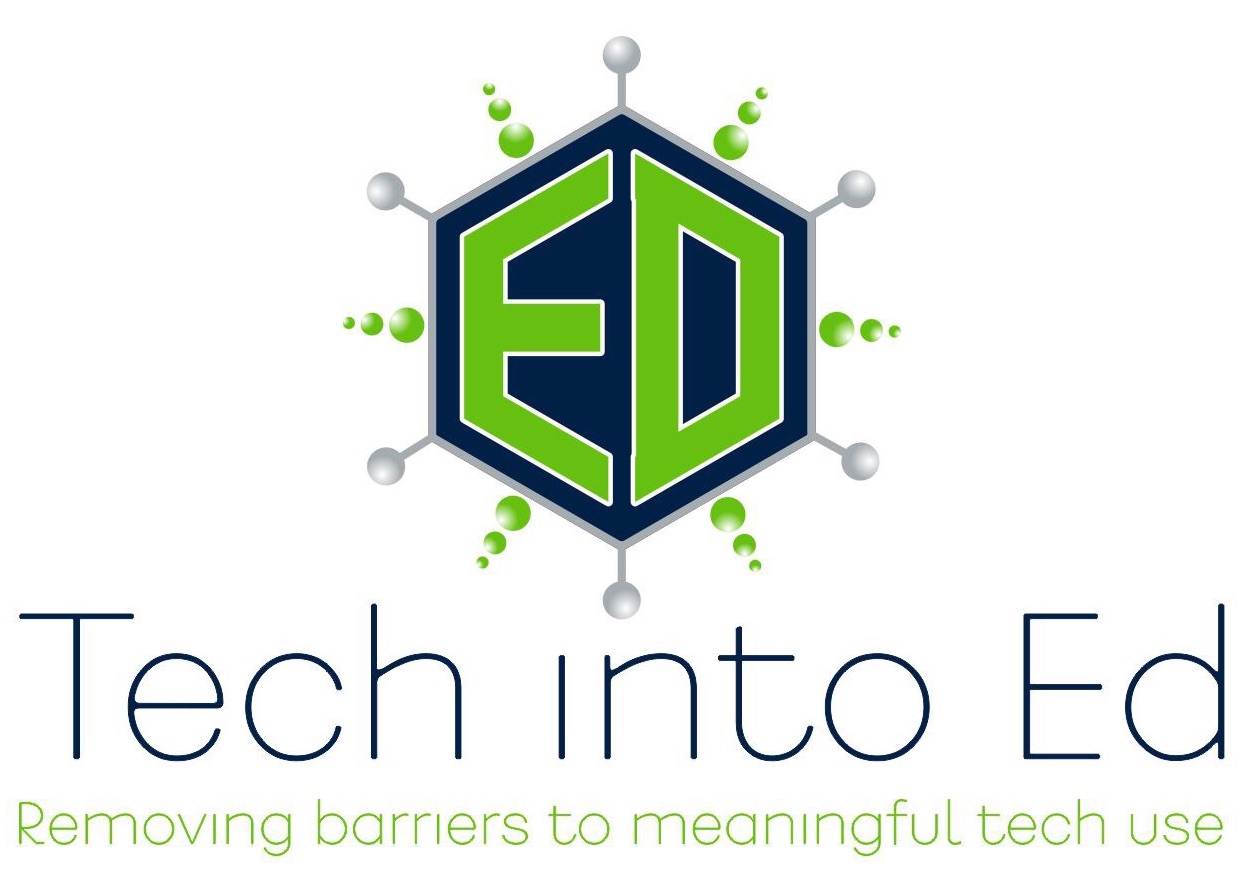
Removing barriers to MEANINGFUL technology use!
You Can't Teach Advanced Use of Technology
In today's world, educators tend to take more than their fair share of abuse from the general public, from lawmakers, and even from parents and students. So, when I get a chance to boast of the talents and dedication of the wonderful teachers that I have an opportunity to work with, I take it.
One thing I have always known about my colleagues in education is that we are among the most resourceful and creative professionals that anyone can imagine. As a profession, we are tasked to do an incredibly important job, often without the budget or resources to do that job with ease (I'm talking about the budget of an individual classroom teacher here). Yet, we almost always find a way to get the job done within the budget we are given. This is just one way we demonstrate how creative and resourceful we are (even though it most often goes unnoticed).
Those two skills, resourcefulness and creativity, are essential tools in all aspects of a teacher's world, including the meaningful incorporation of technology.
Last week I started my first session in a three week session on "Advanced Google Use in the Classroom." The name happened naturally and probably without enough consideration. We have a Beginner's Guide to Using Google course, and we needed to offer the next level of that. The Advanced Google Use course was born.
However, advanced use is an absolute misnomer. I have really thought about this, and I just can't come up with a clear definition or an outline of what Advanced Google Apps use actually is. I can come up with examples of how Google Apps can be used in a more complex way, or for more interesting outcomes, but I just cannot put my finger on what I would teach in a course titled "Advanced Google Use in the Classroom" that would be all that much different than what we are teaching in the beginner's level course.
That is likely a sign of the perfect design of the tool set. Google Apps (like other well designed platforms) is easy to use. The skills learned and used in one tool are often closely related to skills you would use in another tool. That quality is probably at the heart of my argument. Once I've taught somebody the concept of sharing (which is truly a beginner level skill in the world of Google Apps), it applies everywhere. Once I've taught them about the auto-generated URLs of all documents in Drive, that skill wraps neatly into every other tool. The same is true of image manipulation, text editing, and even embedding (perhaps a "slightly" more advanced skill, but even that I question).
However, there is significant difference between the way a "beginning" Google Apps user interacts with the Google tools, and the way a more "advanced" Google user utilizes the tools.
If the skills needed to function both as a beginner and an advanced user are nearly the same (and yes, I get that somebody who knows how to script in Spreadsheets has a far more advanced skill than we would teach beginners...that's about the best example I can come up with of a truly advanced skill), the delineation between these two uses has to exist within something the user brings to the experience.
Pinpointing what that special something is might not be as hard as it seems. There seem to be two key elements that a more advanced user has that a beginning user does not.
1. Platform-wide Thinking Related to Product Design
When a user begins to understand how the platform is built, how the tools are inter-related, and how the tools can interact to create a desired "effect," the user can begin to manipulate the tools in a way that they weren't initially intended or that the beginner may not be able to see as possible.
2. Creativity
Once the platform tools are understood, the user can begin to imagine what could be possible, running mental "experiments" on the way tools will perform together before actually developing the final product. In this way, the use is creatively considering what problem needs to be solved or what need must be met, and then developing a way to resolve that issue or meet that need with the
tool set in front of them.
To be honest, this seems to be the advantage that our young people (our "digital natives") have over adults (the "digital immigrants"). They tend to see the inter-relatedness of these products because they have not experienced a world where design wasn't a consideration in the end user experience. They have an expectation that the tools work together, and as a result, they do not have to put much emphasis on first understanding the platform.
With that said, it seems apparent to me that our emphasis needs to be on teaching our "beginners" not only how the products we teach them to use work, but how they are designed to work together. It also seems to me that if we find products that are not designed to work together, we consider if they are a product that is truly necessary in our environment, and if not necessary, we consider removing the product. As Technology Coaches/Coordinators/Integrators, our systems level knowledge of how tools work together mandates us to help remove the hurdle of poorly designed technology from educational environments for the betterment of all!
Once we help our newest users begin to build an understanding of how tools and platforms work together, I know that we will not have to teach "Advanced Tech Use" courses to teachers. They will begin to apply skills that most teachers have learned, developed, and honed innately -- their resourcefulness and creativity. That's the moment I am most excited to see in the teachers that I work with, because that is the moment when all of the frustration and stress about using technology clears and a moment of realization and clarity takes its place. That's the moment they become "advanced" technology users because its the point where the journey stops being about the technology and re-focuses on teaching and learning!
 Taking basic skills and turning them into masterful performances is driven by creativity and resourcefulness.
Taking basic skills and turning them into masterful performances is driven by creativity and resourcefulness.
Professional Development: Preparing Attendees to Re-awaken the Inner Drive
Somehow they re-awaken in me to the possibilities and opportunities that present themselves in my professional life. They lend a rush of enthusiasm as I unplug from the day-to-day realities of my job and look more broadly at the scope of my profession and the challenges that I face in it.
I'm talking about the meaningful professional learning opportunities and conferences I am able to attend from time to time as a part of my professional responsibility and growth. Each time I am able to truly engage in a meaningful conference or pd event, I walk away with a flood of valuable and "innovative" ideas that offer options and solutions that were somehow beyond the realm of imagination or possibility for me/my organization before the event. To me, and to the people that I "represent" each time I attend those events, that matters. It provides new ideas and options, new perspectives and valuable considerations, and a re-invigorated colleague that can offer new energy to the organization.
What strikes me in this reflection, though, is the unfortunate reality that most of my colleagues don't have the same experience or perception of conferences. I struggle to suggest that this is entirely their fault. Good professional development sessions and conferences (or should I say good professional learning experiences) -- I mean the really valuable meaningful kind that you wish were longer so you could absorb just a little bit more -- are rare. Sometimes this is the fault of the organizers, and they should take the blame squarely on the chin for wasting an incredible opportunity to impact meaningful change in education. More often, though, this is the result of the inability of those attending the session/conference to prepare in a meaningful way for the experience. Whether it is a classroom teacher who is busily pulling together sub plans at the last minute and making phone calls to parents while on the way to the conference, or administrators who are able to focus only part of their attention on the presenters/sessions because their attention is being "beckoned" back to the district/building, the attendee isn't able to focus fully on what they hope to make of and take from the conference experience before, during, and after the event. This is even more true when we consider in-district professional development that happens before, during, or after a day with students.
We know that meaningful learning happens when learners are personally "available" and open to the concept of having a meaninful experience. That doesn't happen when our professional educators are struggling to even maintain focus on the experience they are having -- when they can't pull away from the details that draw us into the "rut" of our daily professional lives. That doesn't happen when they can't converse with their team, administrator, or PLC prior to attending. That doesn't happen when they cannot take a moment to reflect on the experience and share their take-aways from the experience.
It's a lesson those who structure, develop, and authorize the attendance of professional learning need to remember and consider when we put precious financial resources into developing and/or sending our staff to these events. As much as professional development and conference attendance can cost, considering the greater cost of not allowing these people to ready themselves to have a great, meaningful experience is just as, or even more, costly! Those responsible for allowing staff members to attend these events must find ways to allow and encourage them to be more available to make every professional learning opportunity a transformative and invigorating one. Those buiding and offering those opportunities for professional growth need to be cognizant of this essential element of the learning process.
Episode 10: Collaboration is Invigorating
Recently I finished my first attempt at teaching a masters level course in the use of multimedia in teaching and learning. It was truly a great experience and the students were engaging, accepting, open-minded, and thought provoking in their response to the technology that was introduced throughout the class.
The letdown at the end of the class, however, is that the collaborative energy that is generated as we work with other motivated professionals has also come to an end. This got me thinking: how can we sustain this important energy and enthusiasm in our professional lives without having to pay hundreds or thousands of dollars to colleges and programs? The reality is that it isn't as tough as it seems, but it takes a commitment to making it happen. Listen to the podcast to hear just some of my ideas about how you can practically make it happen.
Just a suggestion: DO IT NOW! Now most educators have a moment to breathe. Set up your collaboration teams early in the summer! Wait too long and summer will pass before your eyes. Wait until fall and it will likely not happen. How quickly we forget that the second that first bell rings we hold our breath and wait for a chance to breathe again; that next breath is generally not available until summer.
As always, we would love to hear from you. Find us on Twitter, @brianyearling, and email us at gettingtechintoed@gmail.com .
Thanks for visiting and listening.
Brian
Episode 4: Building a personal/professional learning network
Over the past few years I have been on a journey of my own in my experimentation with technology in my classroom, and I remember so well the scary and frustrating moments where I questioned my own motivations for incorporating technology. There were many stopping points for me along the way where I spent a lot of time searching for answers to questions and for solutions to problems. And it is in reflection of this that I’m offering the topic of today’s show: building a educational technology professional learning community that can surround and support you in your own journey.
The reality is that motivated teachers need to find ways to work more collaboratively and efficiently to train themselves on the use of technology that will enhance the education of our students. So let’s look at a couple of tools to get you started to help you build your professional technology network.
Popular podcasts
The most important piece of my professional learning community has been the podcasters that I have adopted into my life. I want to share a few great starting tips that will get you on the road to implementing this essential element into your web of professional growth.
- Find someone you like listening to. Someone where you like the sound of their voice, and the quality of their advice.
- Find someone who updates regularly. Podcasters start and stop their podcasts every day, and as a result, their isn’t that guarantee of longevity. Finding someone who has invested the time and the effort to produce regularly over a long period of time is the best bet you will find in the podcasting world.
- Find an aggregator that you feel comfortable with. The two aggregators that I use are: 1) Itunes and 2) Juice.
And here are a few of the shows I strongly recommend for teachers who are truly interested in finding more ways to get technology into your classroom instruction.
- Ed Tech Talk Weekly Round-up: This is a show for those of you who want a lot of links to new instructional technology tools, resources, and articles.
- The Tech Teachers by Ray and Holley: I like this show because the hosts are passionate about the use of technology in their classroom and in their daily lives.
- Tech Chick Tips: These ladies are fantastic, practical and tech savvy, but they always focus on how the technology can solidly integrate into the classroom seamlessly.
Best blogs
Another way of connecting on the Internet is through the more standard use of text. Here are a few links for those of you looking for recommendations. However, searching for blogs is something that anyone can do, and you really need to find a blog that speaks to you and that you will actually keep up with.
http://www.jameslogancourier.org/ 2007 Winner for the Weblog Award for Best Education Blog
http://www.washingtonpost.com/wp-dyn/content/article/2007/01/02/AR2007010200468_pf.html This is a list from Jay Matthews, a Washington Post Education Columnist, in which he compiles links to his favorite education blogs.
Finally, I’m inserting a link to the 2008 Edublogs Awards page. There you can search through the nominations and categories to find blogs/resources that you really like and could learn something new from: http://edublogawards.com/2008/
Join an online community
In the Web 2.0 world, there are communities of educators and educational thinkers and decisions makers that are uniting in one piece of online real estate. By becoming an active member you gain the “networked” status that so many professionals attend time-sapping conferences for.
Essentially, Twitter is a type of social networking tool. I “grew”my network and found that the people I followed were doing interesting things and were adding interesting content to Twitter. As a result, I was getting interesting links each day.
I’ve dropped a link to a list of some of the top people to add to your Twitter network into the show notes. This is one place to go right away after signing up for a Twitter account. Trust me, Twitter is useless without a network, so that is really one of the first things you want to do. http://blogs.msdn.com/alfredth/archive/2008/11/29/top-10-education-people-to-follow-on-twitter.aspx
If you are interested in following me on Twitter, you can add me: brianyearling
Tech Trials: Wetheteachers.com
This week in tech trials, I want to share a resource that I’ve just found and that I am experimenting with as we speak.
We the teachers was founded by a couple, Nate and Amy, who saw a need for a free online community where resources (lesson plans and files) could be shared between teachers. From the description on the page, it sounds as if the couple is committed to keeping the resource free and open for teachers to collaborate online. It is free to join, and there are many benefits to being a member of the community.
Members of the community can upload their best lesson plans, can join groups online, and can upload their best files for all to share. They can also download those same files from people across the country and across the world, so it is a site that is definitely worth a look for any teachers interested in gaining an instant community of teachers to connect with.
